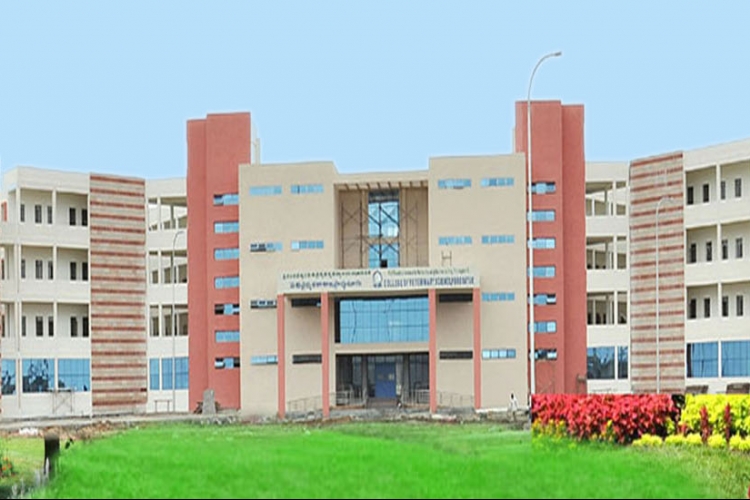The College of Veterinary Science in Tirupati was originally established on 15 July 1955 at Bapatla under the Department of Animal Husbandry and was affiliated to Andhra University. In December 1957, it was shifted to Tirupati to serve the needs of the Rayalaseema region. Postgraduate programmes commenced in 1967, followed by the introduction of Ph.D. programmes in 1976. Initially functioning under Andhra Pradesh Agricultural University, and later ANGRAU, the college came under the fold of Sri Venkateswara Veterinary University after its establishment in 2005.
The College of Veterinary Science. Tirupati is managed by Sri Venkateswara Veterinary University, which oversees its academic, administrative and research activities. Its primary objective is to produce competent veterinary graduates and postgraduates, develop cost-effective and practical technologies for the livestock sector, and contribute to the sustainable growth of animal husbandry and allied industries through education, research, and extension work.
Located on Chittoor Road in Prakasam Nagar Colony within the SVVU campus in Tirupati, Andhra Pradesh, the college is set amidst a spacious and well-planned environment. The campus spreads over about 200 acres, providing ample space for academic blocks, laboratories, clinical facilities, farms, and student amenities.
The College of Veterinary Science, Tirupati is conveniently connected to major transport hubs. Tirupati Railway Station is located about 4.2 kilometres away, making it easily accessible by road. The nearest airport is Tirupati International Airport, situated approximately 25.2 kilometres from the campus, which connects the city to several major destinations.
The institution is approved and recognized by the University Grants Commission and the Veterinary Council of India. It is affiliated to Sri Venkateswara Veterinary University, which is also accredited by national bodies such as ICAR and NAAC. These recognitions ensure that the college maintains high academic and professional standards.
The College of Veterinary Science, Tirupati offers undergraduate, postgraduate, and doctoral programmes in veterinary and animal sciences. The Bachelor of Veterinary Science and Animal Husbandry (B.V.Sc. & A.H.) course was the first to be introduced, with an initial intake of 48 students. Postgraduate courses leading to the Master of Veterinary Science (M.V.Sc.) were introduced in 1967, while the Ph.D. programme began in 1976. These courses aim to provide both theoretical knowledge and practical skills, preparing students for careers in veterinary practice, research, and the livestock industry.
The College of Veterinary Science, Tirupati, offers a robust academic infrastructure designed to provide quality education, practical training, and research opportunities in veterinary and animal sciences. The campus houses spacious and well-ventilated lecture halls with audio-visual facilities, modern laboratories for various disciplines, and a fully equipped veterinary teaching hospital that caters to both small and large animals. There are specialized units for diagnostics, surgery, reproduction, and clinical medicine, enabling students to gain real-time exposure to veterinary practices.
To support experiential learning, the college maintains livestock, dairy, poultry, sheep, goat, and swine farms, allowing students to engage in hands-on animal management and production techniques. The central library is stocked with a rich collection of textbooks, reference materials, journals, and digital resources, complemented by computer labs with internet access for research and academic work. Dedicated research centres and project facilities encourage innovation and problem-solving in areas relevant to the livestock and poultry sectors. Together, these resources create a comprehensive environment that blends academic knowledge with field-level skills, preparing students for both professional practice and advanced research.
The faculty of the College of Veterinary Science, Tirupati, comprises highly qualified and experienced academicians, researchers, and clinicians drawn from diverse fields of veterinary and animal sciences. They bring a strong blend of academic expertise, practical skills, and research experience to the classroom and clinical settings. Many have advanced degrees and specialized training in their respective disciplines, enabling them to offer in-depth subject knowledge along with hands-on guidance. The faculty is actively involved in teaching, research, and extension activities, contributing to the development of innovative practices and technologies for the livestock sector. Their commitment to student mentoring and professional development ensures that graduates are well-prepared for careers in veterinary practice, academia, industry, and research.







 Some Highlights about College of Veterinary Science, Tirupati, Andhra Pradesh
Some Highlights about College of Veterinary Science, Tirupati, Andhra Pradesh
 The University shall work for …
The University shall work for … Improving the quality enhancement of education in Veterinary, Dairy and Fishery sectors in order to produce competent graduates and postgraduates to increase livestock wealth and to benefit livestock farmers, fish farmers, and processing industries.
Improving the quality enhancement of education in Veterinary, Dairy and Fishery sectors in order to produce competent graduates and postgraduates to increase livestock wealth and to benefit livestock farmers, fish farmers, and processing industries. Post-harvest handling and value addition to livestock, dairy and fishery products.
Post-harvest handling and value addition to livestock, dairy and fishery products.